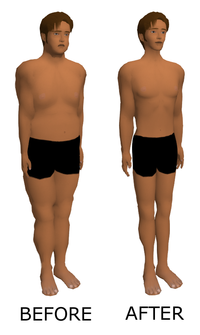
Photo from wikipedia
PURPOSE To examine the parent's perspective on how the child's diagnosis of a developmental disability, the weight-management support of the healthcare provider and parental self-care and role modeling influenced the… Click to show full abstract
PURPOSE To examine the parent's perspective on how the child's diagnosis of a developmental disability, the weight-management support of the healthcare provider and parental self-care and role modeling influenced the child's weight-related behavior, (i.e. nutrition, physical and sedentary activity). DESIGN AND METHODS This qualitative study, guided by Bronfenbrenner's Ecological System's Theory, used a one-on-one semi-structured telephone interview conducted with 15 parents of children 5-16 years of age with spina bifida or Down syndrome. Interviews were professionally transcribed and thematically analyzed. In addition, parents reported height and weight for themselves and their child. RESULTS Three overarching themes within the context of how the child's diagnosis influenced the child's weight-related behaviors emerged: 1) Developmental Characteristics or Condition-Related Factors captured qualities of the child's condition and interactions with the healthcare system; 2) Social Consequences encompassed the influence of the diagnosis on relationships of the child and family members; and 3) Parenting Influences and Practices captured three types of responses including parent perceptions of the diagnosis, parenting behaviors, and parental self-care behaviors, each influencing the child's weight-related behaviors. CONCLUSIONS Parents illuminated the social and medical challenges that the family encountered due to the child's diagnosis. These challenges directly and indirectly influenced the child's physical and sedentary activity and nutritional intake. Although challenges were present, the strength and determined attitudes of the families became apparent. PRACTICE IMPLICATIONS The promotion of self-care and examination and validation of the emotional aspects of parenting a child with a disability may positively influence the child's weight-related behaviors.
Journal Title: Journal of pediatric nursing
Year Published: 2019
Link to full text (if available)
Share on Social Media: Sign Up to like & get
recommendations!